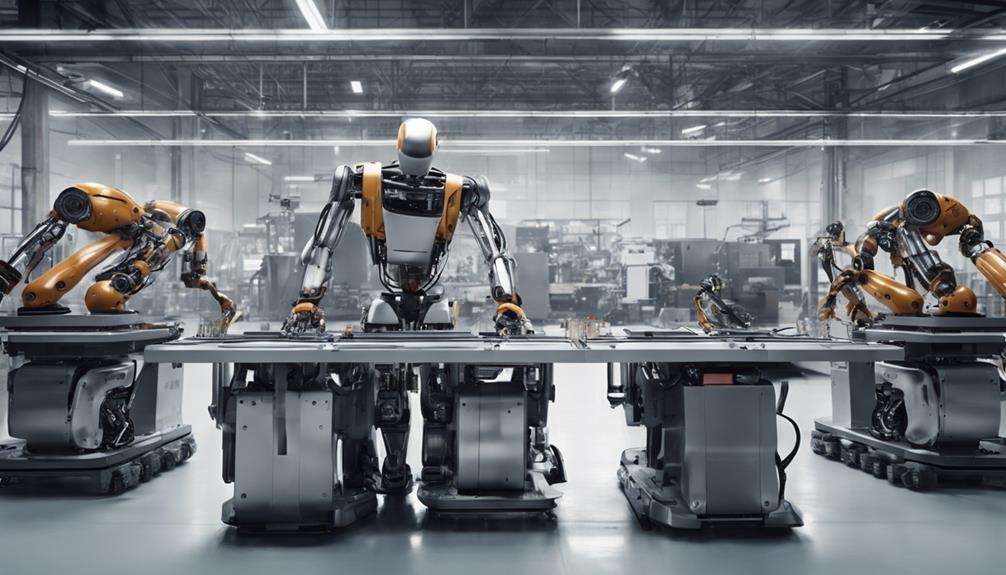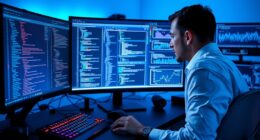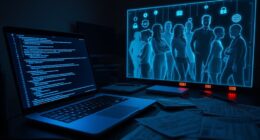The rise of AI in the entertainment industry, particularly its ability to replace actors, sparks meaningful conversations about the evolving landscape of cinema and storytelling techniques. As technology continues to progress, there is a increasing interest in the authentic and emotional depth that human actors bring to movies. While AI offers exciting possibilities, the complex interplay between technology and artistic expression leads us to contemplate the implications of this transformation.
In this dynamic sphere where innovation meets tradition, how will the role of actors evolve, and what ethical considerations will shape the narrative fabric of AI-driven entertainment?
Key Takeaways
- AI challenges traditional emotional depth and authenticity in acting.
- AI-generated content redefines traditional acting roles and production processes.
- Balancing technology and creativity crucial for AI-driven entertainment.
- Ethical considerations in AI integration necessitate transparency and consent.
Impact of AI on Acting
The integration of Artificial Intelligence (AI) into the realm of acting has sparked a profound shift in the entertainment industry's landscape, challenging the traditional paradigms of emotional depth and authenticity crucial to compelling performances. While AI, especially generative artificial intelligence, has made significant strides in the digital realm, Hollywood studios are increasingly exploring its capabilities in creating digital likenesses of actors for visual effects.
However, AI lacks the nuanced emotional depth and authenticity that human actors bring to their performances. Actors have the advantage of adapting their performances based on reactions, a flexibility that AI algorithms currently lack. The vulnerability and authenticity actors infuse into their roles create captivating performances that AI struggles to replicate.
Furthermore, AI faces challenges in improvisational artistry and creativity, areas where actors excel. While AI enhances the creative process and offers new possibilities, actors remain irreplaceable due to their unique ability to convey genuine emotions and deliver authentic performances that resonate with audiences.
Challenges of AI in Entertainment

Amidst the rapid technological advancements reshaping the entertainment industry, the integration of Artificial Intelligence (AI) presents a myriad of challenges that underscore the complexities of merging cutting-edge technology with the art of storytelling.
While AI tools can create digital doubles and manipulate actors' images for various purposes, actors worry about the implications of using AI in entertainment. One of the primary concerns is that AI lacks the genuine emotional depth and authenticity that human actors bring to performances.
Unlike human actors who can adapt and respond to unforeseen circumstances, AI follows predetermined algorithms, limiting its ability to improvise and bring creativity to acting roles. The complexity and nuance of human emotions pose a significant challenge for AI, as it struggles to convincingly replicate the wide range of emotions portrayed by human actors.
Despite advancements, the consensus remains that AI cannot fully replace actors, particularly in conveying authentic emotions and unique perspectives that human actors bring to the screen.
Future of AI-Generated Content
As the entertainment industry continues to evolve, the integration of AI-generated content is poised to redefine traditional acting roles and production processes. Studios are increasingly exploring the use of artificial intelligence to create digital replicas of actors, a move driven by cost-saving measures and production efficiencies. This involves employing advanced technologies such as generative AI and photogrammetry to produce realistic digital doubles through precise body scans.
However, the emergence of AI-generated content has sparked discussions and negotiations between actors, guilds, and industry stakeholders. Concerns have arisen regarding the potential implications on actors' rights, particularly in instances where synthetic performers are created or performances are altered post-production.
The ongoing dialogue surrounding the use of AI in content creation reflects a broader conversation within the entertainment industry about balancing technological advancements with the preservation of artistic integrity and storytelling authenticity. The future landscape of AI-generated content in entertainment remains a dynamic space where innovation and collaboration will shape the way forward.
Balancing Technology and Creativity

Balancing the integration of AI technology with human creativity in the entertainment industry presents a critical challenge for maintaining the authenticity and artistic essence of performances. As AI advancements continue to evolve, concerns arise regarding the potential for AI to replace actors and impact traditional acting methods. Studios and unions are actively negotiating terms to address fears surrounding the future of acting careers in an AI-dominated landscape. Finding a harmonious balance between leveraging AI to enhance images and performances while preserving the unique human touch is essential for the industry's evolution.
| Challenges | Impacts | Strategies |
|---|---|---|
| Maintaining authenticity | Potential job displacement | Negotiating terms between studios and unions |
| Preserving artistic essence | Evolution of acting techniques | Embracing AI to enhance, not replace, human creativity |
| Balancing technology and creativity | Shift in industry dynamics | Investing in talent development programs |
As the entertainment industry navigates the intersection of AI technology and human creativity, the key lies in embracing innovation while safeguarding the core elements that define exceptional performances.
Ethical Considerations in AI-Driven Entertainment
The ethical implications surrounding the integration of AI technology in the entertainment industry's creative processes are becoming increasingly pertinent as concerns over actors' digital replicas and consent issues continue to escalate. With the potential for AI-generated digital clones to replace human actors, questions of ownership, consent, and the future of acting careers have come to the forefront.
Organizations such as the Screen Actors Guild-American Federation of Television and Radio Artists (SAG-AFTRA), Writers Guild of America, and the Alliance of Motion Picture and Television Producers are actively involved in advocating for transparency and consultation before the utilization of synthetic performers in films and TV shows. As studios and performers navigate negotiations on obtaining consent for digital alterations and the use of digital replicas in productions, the industry is grappling with the need to establish clear guidelines and ethical considerations to ensure the fair treatment of all parties involved, including background actors and the broader creative community.
The evolving landscape of AI-driven entertainment underscores the importance of addressing these ethical considerations to uphold the integrity of the entertainment industry.
Frequently Asked Questions
Is AI Replacing the Role of Humans?
AI is gradually replacing human roles across industries, raising concerns about job displacement. As technology advances, it is imperative to establish clear guidelines and ethical frameworks to mitigate potential challenges and ensure a smooth transition.
Will Artists Be Replaced by Ai?
Artificial Intelligence poses a growing concern for artists in various fields, including entertainment. While AI's capabilities are advancing, the nuanced creativity, emotional depth, and unique perspectives that artists bring to their work remain irreplaceable, preserving the essence of human artistry.
Is AI Going to Take Over Hollywood?
AI is poised to revolutionize Hollywood by streamlining production processes, enhancing visual effects, and offering new creative possibilities. While AI may transform the industry, human creativity, emotion, and connection in storytelling remain irreplaceable.
What Is the AI Issue With Actors?
The AI issue with actors revolves around the potential displacement of real performers by AI-generated metahumans. This technological advancement raises ethical and professional dilemmas in the entertainment industry, necessitating careful consideration of consent, authenticity, and artistic integrity.
Conclusion
In conclusion, as technology continues to advance in the entertainment industry, the role of actors is being transformed by AI. Despite the challenges in replicating human emotions authentically, the collaboration between AI and human creativity presents new opportunities for filmmakers.
The future of AI-generated content holds great potential, but it is crucial to maintain a balance between technology and creativity. As the industry evolves, the adage 'innovate or die' reminds us of the importance of embracing change in this dynamic landscape.
Ava combines her extensive experience in the press industry with a profound understanding of artificial intelligence to deliver news stories that are not only timely but also deeply informed by the technological undercurrents shaping our world. Her keen eye for the societal impacts of AI innovations enables Press Report to provide nuanced coverage of technology-related developments, highlighting their broader implications for readers.










